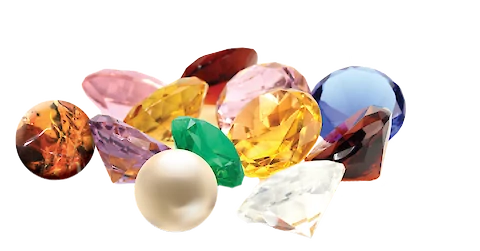Gems Stages
 Sapphires
Sapphires
Sapphires like to choose the activities in which they participate. They are still aware of their own interests and what they enjoy.
Characteristics:
- Normal aging, and may feel depressed due to changes associated with aging.
- There are no significant changes in cognition.
- Can learn new things, but takes time, effort, and practice to do so.
Activities:
- Ask what they would like to do and let them decide. Spend time doing one of their favourite things.
- Pamper them with something like a spa day or a trip to the barber/beauty shop to make them feel a little less “blue.”
 Diamonds
Diamonds
Diamonds like to feel competent and valued, and it is important for them to feel comfortable and in control.
Characteristics:
- Can perform old habits and routines, and prefer the familiar. May have difficulty with change.
- May become rigid, especially under pressure.
- Repeat themselves by telling the same stories and asking the same questions.
Activities:
- Have lunch or dinner at a familiar place, such as at home or at a restaurant.
- Attend a concert or play. Get some fresh air by walking or chatting on the porch.
 Emeralds
Emeralds
Emeralds are most comfortable when doing familiar tasks. They like to engage, help others, and want to feel like they have a purpose.
Characteristics:
- May get lost in their past lives, places, and roles.
- May have problems with communication and comprehension asking who, what, where, and when often.
- May lose or misplace important things and may become afraid and accusatory.
Activities:
- Use social preferences to choose activities. Choose favourites of the past, but do limit the amount of time doing the task to not overwhelm them.
- Perform a familiar task together. Cook a meal, go fishing, or make jewellery.
- At a family meal, engage them to help set the table and clean up. Keep gathering small to minimize increased level of stress
 Ambers
Ambers
Ambers like to manipulate, gather, and touch things. When thinking of an activity, think of things that would be sensory stimulating. They also enjoy what is familiar.
Characteristics:
- Focused on sensations (touch, feel, smell, etc.).
- May get into things.
- Impatient.
Activities:
- Select activities that allow them to use their senses like sorting fabric squares or watering the garden and picking flowers. Be aware that they may not do what is expected so being flexible and calm is key.
- Enjoy a sing-a-long or musical program or go to a place that is visually interesting.
 Rubies
Rubies
Rubies like rhythmic movements and actions and may be fascinated by watching others and checking things out. They like to pick up, hold, carry, rub, or grip things.
Characteristics:
- Fine motor skills are lost or stop in the mouth, eyes, fingers, and feet.
- Limited visual awareness.
- Can move forward but can’t back up safely. May need help to get going.
Activities:
- Go for a short walk, if capable, to a park where people, birds, and animals are to listen to the sounds. Use caution as Rubies can fall easily.
- Give them something soft, like a stuffed animal, to hold and nurture.
- Sing, hum, or sway with them.
 Pearls
Pearls
Pearls like pleasant sounds and familiar voices. They also like to feel warm and comfortable.
Characteristics:
- Not aware of the world around them.
- Hardly move.
- Problems swallowing.
- Hard to get connected.
Activities:
- Spend time reading or talking about good memories. They might not understand the words, but the voice soothes.
- Brush their hair and apply lotion to their hands.






